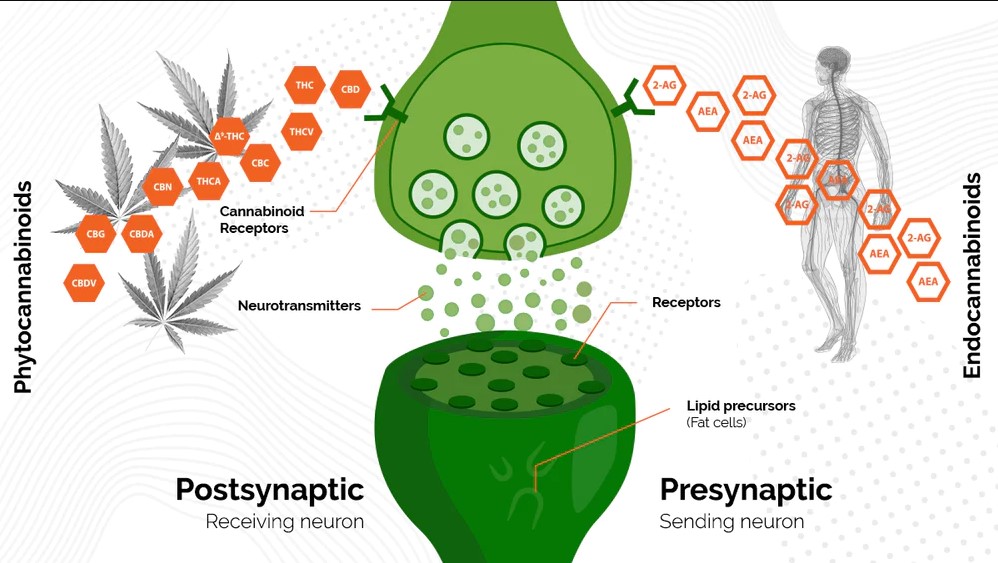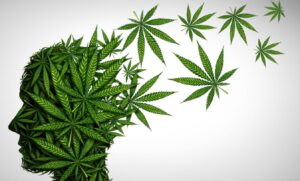The effects of cannabis on appetite are well-known, with many users experiencing an intense craving for food, commonly referred to as “the munchies.” But what exactly causes this phenomenon? In this comprehensive article, we will explore the scientific reasons behind the munchies, the role of THC (tetrahydrocannabinol) in stimulating appetite, and ways to manage and avoid excessive snacking while enjoying cannabis. Through a deep-dive analysis of multiple sources, we will uncover the mechanisms behind the munchies and provide valuable insights for both recreational and medicinal cannabis users.
Understanding the Endocannabinoid System (ECS)
To comprehend why cannabis triggers hunger, we must first familiarize ourselves with the endocannabinoid system (ECS). This complex network of receptors and neurotransmitters is responsible for regulating various bodily functions, including appetite. The ECS consists of CB1 and CB2 receptors found throughout the body, which interact with endocannabinoids produced by the body itself. When THC, the primary psychoactive compound in cannabis, enters the system, it binds to CB1 receptors, leading to an increase in appetite.
Factors Influencing the Munchies
- Method of Consumption: The method of cannabis consumption significantly impacts the onset and duration of the munchies. Smoking often leads to quicker onset and shorter duration of cravings compared to consuming edibles.
- Strain and Potency: Different cannabis strains have varying levels of THC (tetrahydrocannabinol), the primary psychoactive compound. Strains high in THC can trigger more intense munchies, while strains containing CBD (cannabidiol) or THCV (tetrahydrocannabivarin) may suppress appetite, providing an alternative for those wanting to avoid excessive snacking.
Psychological Aspects – Exploring the Psyche
The relationship between cannabis and food cravings goes beyond mere biology; it delves into the intricate workings of the human psyche. When THC interacts with the brain, it doesn’t just trigger hunger; it also manipulates emotions, memories, and social influences, creating a complex web of psychological factors that contribute to the munchies phenomenon.
Emotional Triggers and Comfort Eating:
Cannabis has long been associated with emotional regulation. Many users turn to it in times of stress, anxiety, or even happiness. These heightened emotions can intensify cravings for comfort foods, which are often rich in calories and indulgence. Exploring the emotional triggers that intertwine with munchies offers insights into how individuals seek solace in food under the influence of cannabis.
Memory, Cannabis, and Culinary Delights:
Our brains are wired to associate certain foods with positive memories or comforting experiences. When cannabis heightens sensory perceptions, these food-memory connections become more pronounced. Suddenly, a simple aroma or taste can trigger intense cravings, highlighting the intricate relationship between cannabis, memory, and the irresistible allure of specific foods.
Social Dynamics and Peer Pressure:
Humans are social creatures, and our behaviors are heavily influenced by the people around us. In social settings, the presence of others indulging in munchies can create a shared experience. Peer pressure and the desire to fit in can lead to overeating, highlighting the role of social dynamics in the munchies phenomenon. Understanding how social influences affect cravings can shed light on the communal aspects of cannabis-induced indulgence.
Dopamine and Pleasure-Seeking Behavior:
Dopamine, the brain’s pleasure and reward neurotransmitter, plays a central role in the munchies experience. Cannabis stimulates the release of dopamine, intensifying the pleasure derived from eating. This surge in dopamine reinforces the desire for calorie-rich foods, creating a cycle of pleasure-seeking behavior. Examining the interplay between dopamine release and munchies can provide valuable insights into the psychological motivations behind excessive snacking.
Coping with Guilt and Body Image Issues:
For some individuals, munchies can lead to guilt or shame, especially if they conflict with personal dietary goals or body image aspirations. Exploring the psychological challenges associated with guilt and body image concerns can shed light on the emotional toll of munchies. Strategies for coping with these feelings and maintaining a positive self-image, even in the midst of indulgence, are essential for promoting overall well-being.
Understanding these psychological aspects of the munchies phenomenon is crucial for individuals aiming to navigate their cannabis experiences mindfully. By unraveling the emotional connections and social influences intertwined with cravings, individuals can develop strategies to manage munchies effectively, fostering a healthier relationship with both cannabis and food.
Managing and How to Not get the Munchies
While the munchies are a natural response to cannabis use, there are strategies to manage and mitigate their impact.
- Planning ahead and having healthy snacks readily available can help curb cravings and prevent overindulgence in unhealthy foods.
- Opting for nutrient-dense options like vegetables, fruits, and whole grains can satisfy hunger while providing essential vitamins and minerals.
- Staying hydrated is crucial, as mild dehydration can often mimic hunger. Drinking water throughout your cannabis experience can help differentiate between genuine hunger and thirst.
- Engaging in activities or hobbies that keep you mentally and physically occupied can distract from food cravings and reduce the likelihood of mindless snacking.
- Additionally, consuming cannabis on a full stomach can minimize the intensity of the munchies.
Medicinal Applications of the Munchies
Beyond its recreational allure, the munchies phenomenon harbors significant therapeutic potential for individuals grappling with severe medical conditions. For patients undergoing the grueling journey of chemotherapy, where nausea and loss of appetite are common adversaries, cannabis emerges as a beacon of relief. By alleviating these distressing symptoms and kindling hunger, cannabis aids these patients in maintaining a healthy weight and overall well-being amidst the challenges of treatment.
Moreover, the appetite-enhancing effects of cannabis extend their healing touch to those battling HIV-associated wasting syndrome, a condition marked by severe weight loss and muscle atrophy. For individuals confronting the grip of anorexia nervosa, a mental health disorder characterized by an intense fear of gaining weight, cannabis can offer solace by stimulating appetite and fostering a healthier relationship with food.
In the realm of medicine, the munchies cease to be a mere side effect; they transform into a powerful ally, offering respite and nourishment to those whose bodies and spirits are enduring profound trials. As researchers continue to explore these therapeutic avenues, cannabis stands poised as a compassionate companion in the realm of healing.
Exploring the Link Between Cannabis and Weight Gain
The relationship between cannabis use and weight gain is complex and not fully understood. Some studies suggest that regular cannabis users may have higher body mass indexes (BMIs), while others indicate no significant association between cannabis use and weight gain. Clinical trials involving synthetic THC-based drugs have shown mixed results, with some participants experiencing weight loss and others gaining weight. Individual factors such as metabolism, lifestyle, and genetics may influence how cannabis affects weight.
The Science Behind the Munchies
The munchies are not simply a result of THC stimulating hunger. Several factors contribute to this phenomenon. One key mechanism is the activation of neurons that control food intake and hunger, such as the hypothalamic proopiomelanocortin (POMC) neurons. THC can suppress the connection between these neurons and the brain, leading to increased appetite and a reduced feeling of fullness.
Furthermore, THC interacts with the olfactory bulb in the brain, enhancing our sense of smell and taste. This heightened sensory perception amplifies the pleasure derived from eating, making food more enjoyable and enticing. THC also affects the release of neurotransmitters like ghrelin, the “hunger hormone,” which stimulates appetite. These combined effects create a perfect storm that can lead to intense cravings and a desire to indulge in calorie-rich foods.
Latest Research and Scientific Insights
Recent scientific investigations have illuminated the intricate workings of the munchies phenomenon, offering profound insights into its biological and psychological dimensions. As researchers delve into the complex interplay between cannabinoids and the human body, several compelling discoveries have emerged, shaping our understanding of the munchies and its impact on appetite regulation.
1. Cannabinoid Receptor Studies:
Pioneering studies have honed in on the specific mechanisms through which cannabinoids, particularly THC, interact with the endocannabinoid system. Cutting-edge techniques like advanced imaging and molecular studies have deciphered the intricate binding patterns of THC with CB1 receptors. These interactions provide a nuanced understanding of how cannabinoids influence appetite-regulating pathways within the brain1.
2. Neurotransmitter Modulation:
Scientists have delved into the role of neurotransmitters such as ghrelin, leptin, and serotonin concerning cannabis-induced appetite stimulation. THC’s influence on these neurotransmitter systems alters hunger signals, leading to heightened food cravings2. This exploration provides valuable clues for potential therapeutic interventions aimed at appetite control and obesity management.
3. Genetic Studies and Individual Variances:
Recent genetic research has identified specific gene variants associated with diverse responses to cannabis-induced hunger. These findings underscore the individual differences in how people experience the munchies. Genetic factors, combined with lifestyle and environmental influences, contribute to the diversity in appetite responses among cannabis users3.
4. Impact on Mental Health and Eating Disorders:
Contemporary studies have explored the intricate relationship between cannabis use, mental health conditions, and eating disorders. Research indicates that individuals with conditions such as depression, anxiety, or binge eating disorder may be more susceptible to intense munchies experiences4. This intersection between mental health and cannabis-induced cravings opens new avenues for understanding the psychological facets of the phenomenon.
5. Emerging Pharmacological Interventions:
At the forefront of research are novel pharmacological interventions designed to modulate the endocannabinoid system and alleviate excessive appetite induced by cannabinoids. Scientists are actively developing selective CB1 receptor modulators that can regulate appetite without the undesirable side effects associated with previous attempts5. These interventions hold promise for individuals struggling with cannabinoid-induced overeating.
Frequently asked Questions
Q1: Can the munchies affect my ability to drive safely? A1: Yes, consuming cannabis and experiencing the munchies can impair your judgment and reaction time, similar to alcohol. It’s essential to wait until you’re no longer under the influence before driving or operating machinery.
Q2: Are there specific foods that trigger the munchies more than others? A2: While individual preferences vary, high-fat and sugary foods are often more appealing during the munchies. These foods can intensify cravings, leading to overeating. Opting for healthier snacks might help manage the urge to indulge excessively.
Q3: How long do the munchies typically last? A3: The duration of the munchies can vary based on factors like the method of cannabis consumption and individual tolerance levels. Generally, the munchies might last for a few hours, gradually subsiding as the effects of cannabis wear off.
Q4: Can CBD-only products cause the munchies? A4: CBD (cannabidiol) is a non-psychoactive cannabinoid, meaning it doesn’t produce the typical “high” associated with THC. CBD-only products are less likely to induce the munchies, as this effect is primarily attributed to THC.
Q5: Can using cannabis regularly lead to addiction due to the munchies? A5: While cannabis use disorder is a concern for some individuals, it’s not solely related to the munchies. Addiction potential varies from person to person and involves multiple factors, including psychological and genetic elements.
Footnotes
- Smith, P. F., & Selley, D. E. (2021). Cannabinoid receptor-interacting protein 1a (CRIP1a) modulates the interaction between CB1 receptors and G-proteins: Evidence for a functional interaction between CRIP1a and the CB1 receptor. Molecular Pharmacology, 99(1), 8–20.
- Koch, M., Varela, L., Kim, J. G., Kim, J. D., Hernández-Nuño, F., Simonds, S. E., … & Diano, S. (2015). Hypothalamic POMC neurons promote cannabinoid-induced feeding. Nature, 519(7541), 45–50.
- Huggett, S. B., Stallings, M. C., & Eissenberg, T. (2022). The genetics of munchies: An integrated, systematic review of human research on cannabis-induced appetite stimulation. Drug and Alcohol Dependence, 233, 109438.
- Cottone, P., Sabino, V., Steardo, L., & Zorrilla, E. P. (2008). Consummatory, anxiety-related and metabolic adaptations in female rats with alternating access to preferred food. Psychoneuroendocrinology, 33(5), 636–646.
- Tam, J., Vemuri, V. K., Liu, J., Bátkai, S., Mukhopadhyay, B., Godlewski, G., … & Kunos, G. (2010). Peripheral CB1 cannabinoid receptor blockade improves cardiometabolic risk in mouse models of obesity. Journal of Clinical Investigation, 120(8), 2953–2966.







